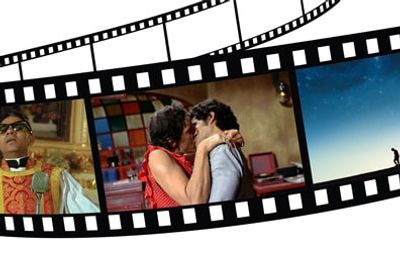By KJ Philp, October 2018 Issue.
In an effort to create a new space for engaging LGBTQ and POC audiences, Trans Queer Pueblo launched ¡Wáchale! FilmFest, which runs through Oct. 27.
Event organizers selected a combination of new releases and classics from across Latin America to spotlight the narratives of queer/trans people of color from developing nations while creating a pace for audiences to commune, transform and organize.
While screenings of Chavela and A Fantastic Woman (Una Mujer Fantastica) have already taken place, the festival continues with the following film screenings:
Nostalgia For The Light | Sept. 22
A film about two different searches conducted in the Chilean Atacama Desert: one by astronomers looking for answers about the history of the cosmos, and one by women looking for the remains of loved ones killed by Pinochet’s regime. A special screening to mark the 45th anniversary of the 1973 U.S.-backed coup d’etat against the government of Salvador Allende in Chile.
Hell Without Limits (El Lugar Sin Limites) | Oct. 6
The return of Pancho to a small Mexican town stirs up discord between La Manuela – an aging trans woman who runs a weathered brothel – and her daughter, La Japonesita. Honor, greed, machismo, transphobia and the dreams of sex workers collide in this vintage hit, newly restored by the Mexican Institute of Cinematography.
Canoa: A Shameful Memory | Oct. 27
For Halloween, we explore Mexican history through horror. Canoa reimagines a real-life incident in gory detail: a small-town priest stirs up a lynch mob, accusing a group of university employees on a hiking trip of being communist agitators. The events cast light on a political horror on its 50th anniversary – the October 1968 Massacre of Tlatelolco, which left more than 200 student protesters dead.
All films are in Spanish with English subtitles and admission is free. Screenings will take place from 6 to 9 p.m. at TQP, 1726 E. Roosevelt St. in Phoenix.
At each event, Con Sabor a Justicia – a trans migrant catering cooperative – will sell Mexican street food to benefit LGBTQ folks recently released from detention.
Echo Caught up with Stephanie Figgins, member of TQP’s media collective, to find out more about the festival, and here’s what she had to say.
Echo: Why is this film festival significant for Phoenix?
Figgins: ¡Wáchale! FilmFest is significant for Phoenix because as LGBTQ+ people, as POC and as migrants, we can be in community and take joy in seeing ourselves and our stories on the screen in a city that lacks cultural spaces where we can see ourselves represented. In fact, most of what we see is cultural institutions that profit off of Black, Latinx and Indigenous art and history, but then refuse to stand up for Black, Latinx, and Indigenous people … we refuse to separate art from politics.
Echo: Why is this space important for POC and LGBTQ audiences?
Figgins: … we need spaces to have fun and make community; because we need to see ourselves on the big screen; and because film is such a powerful way to connect to culture and history.
Echo: What can attendees expect from these screenings?
Figgins: For ¡Wáchale! FilmFest, the films are just as important as where we show them. Our people’s cinema is set up outside the TQP house. We roll down a big white screen and set up a projector, chairs, cushions and blankets. It’s a cinema that was made by the hands of our community – my mother, a migrant from Lima, Peru, hand-sewed the screen for us.
It’s key that all ¡Wáchale! screenings are completely free (although we of course accept donations). Our communities are much more likely to be poor because of hundreds of years of governments taking resources from our communities, and movie tickets cost a lot these days … We want to provide a truly accessible space where people can enjoy new and classic films from Latin America folks [they] wouldn’t otherwise have access to.
Echo: How were these films selected?
Figgins: The ¡Wáchale! film program is selected by an all LGBTQ+ migrant and POC team of TQP members. First, we set out rules: balance classic and contemporary Latin American films and pick films accessible in Spanish and English. Then we chose themes: “outing Latin American cinema,” “queer icons” and “ghosts of Latin American history.” Then we brainstormed, read books, articles, film reviews, and came together to screen films and talk about how they might fit. The ¡Wáchale! program is developing people of color, migrant cultural leaders by facilitating a democratic process of curating film programs – it’s a slow process but a rewarding one.
For more information on the ¡Wáchale! Film Festival, visit facebook.com/transqueerpueblo or follow @wachalefilmfest on Instagram.
¡Wáchale! Film Festival
Sept. 22, Oct 6 & 27
Trans Queer Pueblo
1726 E. Roosevelt St. in Phoenix.
